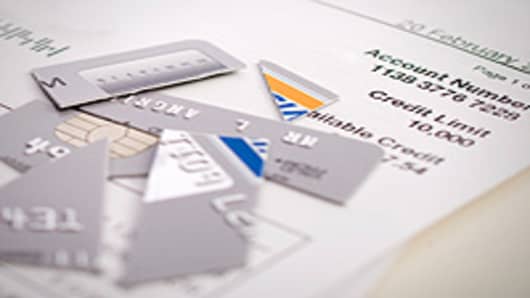During the third fiscal quarter of 2011, U.S. consumers added $17 billion in new credit card debt, wiping out what remained of a $33 billion first-quarter pay down and putting us on pace for a $64 billion net gain in credit card debt during 2011, according to a Card Hub study.
First-quarter debt pay downs are typical, as the first fiscal quarter of the year is when companies give out yearly salary bonuses, the IRS serves up tax refunds, and we’re still committed to New Year’s Resolutions. But in neither 2009 nor 2010 was a first-quarter pay down consumed entirely by the close of the year’s penultimate quarter. What’s more, according to the aforementioned study, the amount of new credit card debt incurred during Q3 2011 was 58 percent and 154 percent higher than what was added during Q3 2009 and Q3 2010, respectively.
These trends clearly display that overleveraging of unsecured credit cardsis getting out of hand. This may not pose an immediate threat, but what happens if the European debt crisis sours and unemployment starts to go back up? In order to help avoid a repeat of Great Recession difficulties, which hurt everyone from small business owners to big banks like Citi and Bank of America , we need to address the problem now.
The first hurdle many consumers must overcome is a mental one. We all need to come to terms with the fact that pre-recession spending habits were not “normal,” so as economic confidence grows, anyone whose income was in any way, shape or form connected to the housing bubblecannot simply revert back to “normal” spending. Instead, current saving-mode fiscal conservatism will have to become the new reality.
The second hurdle is a little more practical, though it too requires a change in perspective. If you currently spend more than you bring in, you’re going to have to make a budget. That means forgoing things to which you have become accustomed, but that are not necessary. The questions you need to pose to yourself when evaluating existing discretionary expenses as well as new ones: Will not having this hurt me on a daily basis? Use this test to identify and cut your most expendable expenses until your after-tax monthly income exceeds your planned monthly spending.


